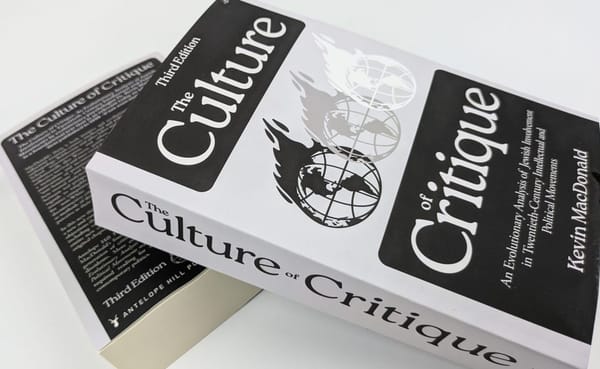Gospel Politics, Nature's Revenge, and the Insufficiency of Scripture
The walls of falsity formed by the 20th century’s conceits are collapsing.

Introduction
Gospel politics doesn't exist. Nature is real. The Bible is insufficient.
Much to the dismay of various groups, some theonomists, evangelicals, and liberals among them, there is no universal political or legal program laid down in detail by the Holy Spirit in Scripture which all nations, regardless of circumstance, must conform to; there is no universal Jesus-culture that can be imposed in exclusion of particularity on any people at any time; nor is there any clear favoritism shown to one particular regime over another in the Bible, whether democratic, aristocratic, or monarchical, for, as one Nazi once noted, each of the three can be found as approved and used of God and of his people—democracy and aristocracy at the time of Moses, and monarchy from the time of Kings Saul and David forward, and all three as mixed in the New Testament church’s constitutional dynamic. And, though monarchy and absolutism have seen something of a revival in our time, at least among theorists and commentators, nevertheless monarchy proper, as an institution and structural regime, proved in itself incapable of stabilizing Israel for the long haul, having degenerated after Solomon until the time of the bastard Herods of the New Testament.
Now this is not an argument against the propriety or utility of monarchy or absolutism, for, though they have been falsely vanquished unto a long exile, King and Prince are in the warp and woof of our christened heritage, and only the naïve or the egalitarian—ignorant or defiant toward basic sociological dynamics—would assert that celebrity, per se, is some sort of crass indiscretion. Hence I make no haste to condemn mere political form. Indeed, I tend to prefer a form of absolutism and I find the populist absolutism described recently by Imperium Press to be especially fascinating. I concur with their prediction that, following the return of the strong gods, strong man politics, naturally, is making its own return, where the personality and deeds of the sovereign win in the contest of legitimacy against the procedure and deliberation of liberalism. His faults notwithstanding, Trump, I suggest, is one American embodiment of this underlying impulse: he has opened the world-historical breach, such that what he represents is just as if not more important than who he is and what he does; and, although certain democratic forms may still avail in the future, doubtless, with the Repeal of the 20th Century, there is no shrinking back to the indecision and exhaustion of its parliamentary inertia.
Stated simply: sacralism, not liberalism, is the future.
The Cosmic Treason of Gospel Politics
The reason that “gospel politics” doesn’t exist is because of the nature and end (telos) of the gospel, and because of the nature and end of politics. These distinctions of nature and telos, along with their significance and the broader framework of which they are a part, have been either lost or diminished in the midst of the furor of the 20th century’s revolutionary mutiny, often obfuscated or outright dismissed by question-begging biblicism which substituted (and still substitutes) hollow tropes and proof-texts for virile cogitation—our robust philosophical and theological patrimony in Christendom be damned, and our present ability to answer our civilizational exigency be neutered. This indistinguishing spirit—perhaps better termed monomania due to its monocausal and monoprescriptive tendencies—may have originally meant well, and may have performed or facilitated some goods here or there. Yet it ultimately has proven to be a viciously enervating force, such that, in what is now embraced as an instinctual fidelity, the gospel is unquestionably perceived and wielded as the ready-made solution for all layers of political life and disorder.
For many, it seems if you simply label your endeavor with the word “gospel” or if you summon common Christian nomenclature and ideas, then it automatically qualifies the work as God-approved: “The Bible says not to oppress the stranger or sojourner; ergo infinity immigration.” Or “Jesus said we must forgive others; ergo Karmelo Anthony escapes justice.” Or “Those Blacks raping and robbing have a sin problem; ergo the only solution is the gospel.” Or “Romans 11; ergo don’t criticize the Jews.” Or "There is neither Jew nor Greek; ergo stop caring about race." Or “Thy will be done on earth as in heaven; ergo some ambiguous political future branded ‘the postmill victory.’” Or “The Gospel Coalition” or “Together For the Gospel” or “Gospel Parenting” or “The Christian Worldview of insert-whatever,” ad infinitum.
I am not suggesting that we should abandon Christian sentiment or language; we shouldn’t. Nor am I suggesting that there is no place for using “gospel” as an adjective or descriptor; Jeremiah Burroughs suggests the contrary. Least of all am I suggesting that we must never apply doctrine concretely; we certainly must. I am suggesting that latent assumptions today—whether concerning politics, or man, or the gospel, or even the ways by which we assess and respond to assorted crises in this present world (Titus 2:12)—are, in many cases, not historically Christian, nor are they properly biblical, nor are they sane. Instead they are vapid and vacuous. However unpleasant it may be to admit, our cherished priors frequently reveal that our Faith has been inarguably infiltrated and vitiated.
Let us seek, then, for vision. The discipline of politics, though not inherently opposed to spiritual or heavenly matters, is not principally concerned with such things; it mainly concerns man in his present earthly life. Politics is, to somewhat modify the Aristotelian conception, the natural and moral activity by which man, as a political creature, orders communal life by justice and virtue, for the sake of eudemony, i.e. the common good and human flourishing. The gospel, on the other hand, principally concerns the way by which man as a sinner obtains forgiveness, righteousness, and the gift of eternal life, and this is primarily dispensed within the institutional church. This view of politics and of the gospel is wonted to the historic Christian Tradition, and can be found in sundry and diverse theologians, pastors, intellects, and writers for centuries.
These clear rudiments being the case, we must arrive at our therefores. Therefore it is against the nature and end of politics to gospelize all political dynamics, just as it is against the nature and end of politics to make it the lone palestra of piety. Therefore it is against the nature and end of the gospel to transmogrify it as a Jesus-blanket to conceal or cloak all political conundrums or interests, just as it is against its nature and end to use it as a performative escape from our natural and political duties demanded of us by Providence and necessity. Therefore the vast majority of professing Christians today, even if they are saved and even if they are tenured academics, do not comprehend the infantile inanity that now overwhelms us. Therefore we are a radical anomaly from the past. Therefore confusion overtakes us, and we flee like fops from a leaf in the wind.
Given these things, we must reckon with a disturbing corollary: to the extent the gospel is wrested in such ways, to that same extent we reveal that we do not understand the gospel. The same goes for politics. If each has its own nature and end, and if the nature and end of each inform us in how to understand and use both, and if men are busily mucking it up concerning their natures and ends, then does this not follow? In other words, yes, I am alleging that some of the most ardent champions of “the gospel” do not actually understand it—at least in its limits. It seems difficult to overstate the profundity, no less than the irony, of this discovery: we have people slapping “gospel” onto everything who are at least partly oblivious to its fundamental purpose. But notation of this as mere fact would be too timid an assessment; we must boldly press into the moral element.
Taking holy things in hand—the gospel is the most holy of things—and abusing them beyond their limits and order is a third-commandment violation, and of such God says he will not hold guiltless. Therefore, it’s possible—and I submit that it is a special leprosy often undetected in our houses by our present priests—that men do sin with the gospel. They sin with Christ. They sin with Scripture. They sin with Christian phrases and tropes. How? By doing just what we have noted: uprooting these matters from their natures, ends, and proper relations, forcing them, like square pegs into round holes, to serve purposes for which God never gave them. We must understand that cosmic treason is more than the creature merely rebelling against the Creator’s direct command; it is also the devilish but plausible art of cheapening His precious treasures by treating them as toys in the game of holier-than-thou peacockery for any number of common reasons. Concerning the unfathomably dire possibilities and eventualities of such iniquity, the Jews stand as a grave terror. They began as a people constituted on the first stages of the gospel under Abraham and Moses and they ended as a people who despised its fullness, for which God righteously slaughtered them by the hand of the Romans under the command of Titus.
I Wed You, Biblicism and Ichabod
“Gospel politics” is clearly only one of the latest iterations of the monomania. Presuppositional biblicism, though in ways wielded as a tool in honest effort at maintaining orthodoxy and in justifying existentiality, has also become, whether through rote devolution or some other means, a ludicrous meme. “By What Standard!?” is now used to mock, sometimes with warrant, certain men who have shown themselves to be one-dimensional in cognition, and, beyond this, often wildly ignorant of the Christian heritage they so readily claim to be their own.
Now, we should clarify. To the extent that this sort of biblicistic methodology has been useful in exposing the faulty assumptions of the unbeliever or in demonstrating his unneutrality, to the extent that it has been applied in other profitable ways, such as in showing that all of life, is in a sense, religious and to be devoted to Christ, and to the extent that it has driven men back to the Bible, then it is to be commended; but to the extent that it has replaced or removed rational argument and empirical observations, to the extent that it has eviscerated the category and utility of common notions, to the extent that it has functionally displaced or even, for some, denigrated the place of nature and natural law and natural theology, and, to the extent that all of this is embraced by professing Christians as an unassailable bulwark of “biblical” intellectual potency, it is not to be commended but to be condemned as an utter usurper. “This is an overstatement,” you may suggest. No, it’s not. The chief academic proponent of theonomy, Greg Bahnsen, and the chief popular proponent of the same, Doug Wilson, have both forwarded the conveniently libertarian notion, rooted in this biblicistic torpor, that we should not criminalize pornography.
So where are we? The walls of falsity formed by the 20th century’s conceits are collapsing with the return of reality and we are now facing a crisis cascade of mammoth proportions. We not only do not know who we are, where we come from, or where we are going; we think we do know all these things, and that the future is most certainly ours, while we simultaneously villainize our own fathers, civil and religious, by heresifying their own convictions and persecuting, under pretense of principle, any man who dares embody them anew. We not only misunderstand God’s law; we use the phrase “God’s law” and conjure the term “theonomy” to curate “political liberty” for the creation, publication, and reception of porn; and we trot out the phrase “general equity”, as if we were possessed of keenest perception, without realizing its theological-philosophical context, both as one part of a couplet to "particular equity" and as what, ironically, amounts to natural law. We are not like the Apostle Paul, who, out of burning natural affection and for the sake of his kinsmen according to the flesh, wished that he could be accursed and cut off from Christ; no, we are far better! We tell ourselves and proudly proclaim to all who will hear us evangelize, though not always in so many words, “I am united to Christ in order to be cut off from all my filthy kinsmen according to the flesh, and my only interest is in the church universal.” The message is clear: grace destroys nature. Never mind that such a sentiment is no indication of salvation, but of damnation.
We are not satisfied with the forgiveness, righteousness, and eternal life given to us freely by God through Christ in the gospel; we know better than God and thus must make the gospel do more than he intended; it must be the hinge upon which every door of temporal life swings; it must be the legitimating label for every endeavor we undertake, hiding our imbecility, fragility, laziness, and wholly anachronistic religious identity, and casting us instead as the truly faithful and bold. And in all of this frenzy, the gospel, the church, the spiritual essence of the faith—all these procure not salvation, but destruction—of nations, nationality, natural bonds, of empirical reality, and of common sense. In the final judgment, any honest eye can only discern this word emblazoned over our theatrics: ICHABOD.
Stated simply, Christianity is made the agent of ruin for the very things that we are told it is to redeem, and this scandalizes the unbeliever, who, in this, sees mistakenly, and perhaps to his eternal detriment, that coming to Christ and embracing the Faith requires that he denature himself.
What bonds of madness have captured the West.
Nature’s Revenge
But after the bonds, praise God, comes the Exodus. The time of Moses in Midian is only a time; soon enough, in God’s power, the seed will be birthed and Pharaoh will be drowned. It is in this context, then, that nature is taking its revenge. Nature, that dreaded foe of liberals and biblicists alike, is lifting the skirt on the monomania—politically, sexually, racially, and otherwise. Nature is exposing the pleasant but pernicious lie of modern “piety” which alleges that the sufficiency of Scripture is more than a doctrine with limits and order; it is—the lie says—first, a magic wand whose mystical powers enable all Christians to be omnicompetent wizards in all domains of life, and second, a badge of world-insight which some clerics seem to take as authorizing them to become the ecclesial policemen of everyone on the internet.
Nature, in its own way, is even perfecting grace; for, in the rediscovery of the once popular dictum that “grace restores nature,” we not only find that the two are not opposed but are complimentary; more than that, we discover that each informs and supplies the other with all neccesaries to secure perfection, a sort of mutual maturation. This means that discretion with nature and a comprehension thereof is necessary to better understand grace. Stated more candidly and perhaps more controversially: to the extent that you do not know nature, you cannot know grace. Stated in a phrase: know nature, know grace, or, in the words of Christ, "If I have told you earthly things, and ye believe not, how shall ye believe, if I tell you of heavenly things?"
Returning to our earlier keystone of nature and telos, we must reckon with this: the doctrine of the sufficiency of Scripture has its own telos, one which is decidedly, according to God’s own design, limited. Stated another way, the sufficiency of Scripture, rightly apprehended, brings with it a corresponding fact: the insufficiency of Scripture. Failure to embrace this other side is the very reason that, as was witnessed recently, some men can’t help but shriek and sigh with Bible in hand when other men raise statistics about Black criminality.
The sufficiency of Scripture, for the biblicist, means that all other considerations outside of Scripture are likely moot at best, or apostasy at worst, and that he needs only read the Bible in a triumphant tone to emerge the victor of a debate. “All have sinned and fallen short of the glory of God,” he says, never realizing that the Negro who resisted arrest did so under the chant, “In the name of Jesus, stop, bitch!” and, when resistant to the taser exclaimed, “That’s Jesus, bitch!” and, having commandeered the officer’s cruiser, spent his time during the joy-ride praying to God. The Bible, for the biblicist, thus becomes a coping mechanism to escape reality, not a heavenly guide to understand it and order it and live well in it. Implied herein—and this is a pregnant irony—is this: Christianity, for the biblicist, apparently cannot equip you to live in the real world; therefore, for all his talk of how the Bible must be our one rule for all of life, he can’t manage to make it yield anything of substance commensurate to incarnate quandaries.
Regardless, given what has been stated, our axiom is this: Scripture is sufficient for some things, not all things; and therefore Scripture is insufficient for some things.
We assert this now, but henceforth will prove it with some syllogisms.
Scripture does not teach language. Language is essential to full political society. Ergo, Scripture is insufficient for full political society.
Scripture does not teach particular customs for your particular people. Such customs are essential to full political society. Ergo, Scripture is insufficient for full political society.
Scripture does not teach detailed particular economic policies; it does not teach scientific, empirical, and technical knowledge necessary for infrastructure and technology; it does not outline a comprehensive education system for all citizens; it does not teach modern military strategy; it does not detail a system or policy of waterworks and sewage, of traffic control, of fuel creation and storage, of public transportation, of aviation systems, of electricity, of health and diet, or of recreational activity. Such things are necessary to full political society in our present day. Ergo, Scripture is insufficient for full political society in our present day.
We can also substitute “gospel” for “Scripture” and the points remain valid.
None of this yields the conclusion that the Scripture is without a place, or that the gospel is opposed to these things in every way, or that the gospel bears no relation whatsoever to political society, or any like thought. Such things are manifestly false. The Scripture being insufficient for some things, is not the same as the Scripture being unhelpful for all things. The same applies to the gospel. To the extent that the Scripture or the gospel can aid us in any of these or other myriad matters, we ought to use them; indeed, we’d be fools not to, for "the entrance of thy words giveth light and understanding to the simple" (Psalm 119:130). And so we say to the men who fancy themselves lightbearers, claiming that Paul was not a Christian Nationalist, have ye not read Romans 13 and Hebrews 11?
Retrieval As a New Redemption
When the Westminster Divines enshrined the words “the books of the Old and New Testament are… given by inspiration of God to be the rule of faith and life” and the “whole counsel of God concerning all things necessary for… man’s salvation, faith, and life is either expressly set down in Scripture, or by good and necessary consequence may be deduced from Scripture,” they, being recipients and furtherers of the Christian Tradition, partly biblical and partly extra-biblical, and they, being benefactors and employers of Ramism and Aristotelianism, and they, being men who learned, knew, and used English, Latin, Hebrew, and Greek, as well as history and mathematics, did not intend by these confessional articulations to suggest that everything in life must be referred back to, sourced in, or somehow justified by the Bible, lest we be found “unbiblical.” It is frankly jejune to suggest otherwise. Further, they did not intend by their confessional articulations to address every possible error that could ever arise in the church militant after they were dead and gone; indeed, much of what they enshrined was the product of responding to then-present historical particularities, which then means they were not addressing what to do about twenty thousand Haitians being dropped into Springfield, Ohio, who steal and eat your cats and dogs.
In other words, our forebears did not undertake the work of statecraft as an exclusively “biblical” project, as if the Bible alone were consulted, or as if they were pseudo-human specters who transcended the constraints and influences of sociological and historical dynamics. Without question, yes, they did use the Bible at times; they even wrote treatises on the politics therein, as in the cases of men like Melchior Leydekker and his work on the Hebrew Republic, or Peter van der Kun on the same, to give two examples. This phenomenon is readily granted and can be seen in others like Augustine and Aquinas. But this is a far cry from biblicism, and none of this is being disputed or dismissed as if it were a fluke.
What is being disputed—in fact, what I am persuaded must be rejected with fury—is the doctrinaire ambivalence or blatant disregard for the wider tradition’s use of extra-biblical material with its attendant embrace of nature and of philosophical systems—a misdeed often foolishly wrought in the name of “the sufficiency of Scripture” or God’s “law-word” or "Christian love." Contrary to the bizarre labor of those who framed the Antioch Declaration, we, tossed to and fro amidst the waves of modernity, must return, not to naked Scripture, but to Scripture adorned with nature and tradition; and therefore we must return to sources like Aristotle, not only because doing so would equip us to avoid writing such facile material, but it would also better enable us to rightly understand (and therefore wield) our own heritage since our fathers readily received his work, along with myriad other non-Christian pagan minds and pens, and employed it all anew.
By this, I am not suggesting that nature or tradition can save the soul of man; Christ alone saves—and you must turn in faith from your sins to him, for the first time or afresh. Nor am I forwarding some sort of Aristotelian reductionism, as if merely reading and comprehending Aristotle will instantly purge us of civilizational anemia; the exigency we face is far greater than simply comprehending some books. No, I, in fealty to the most ardent biblicists and liberals alike, appeal to Scripture and to the greatest Christian missionary of all time, the Apostle Paul, who said, "doth not nature itself teach you?" and, “all things are yours; whether Paul, or Apollos, or Cephas,” or Cicero, or Plato, or Aristotle, or Chrysostom, or Aquinas, or Calvin, or Bartholomew Keckermann, or Johannes Althusius, or Franco Burgersdijk, or William Bradford, or John Winthrop, or George Washington, or Cajus Fabricius; for “all are yours; and ye are Christ’s; and Christ is God’s.”
This is our Christendom patrimony. We must refuse to damn it or sell it, even if doing so means we must be assailed as the troublers of Israel in this present apostasy by those who make broad their phylacteries and long their robes. So be it. For the sake of God, for the honor of our fathers, and for the generations yet unborn, we must forsake the monomania, ruthlessly. Mercy has its limits, and enough has been shown to this usurper. Christ take vengeance and grant us many sons of Samson.
ATTENTION READER: We need your help.
Institutional trust is at record lows. But without institutions, we cannot renew our people, much less provide an inheritance to posterity. In response to this crisis and as an organic outgrowth both of necessity and natural interest, American Mantle exists, not only as a publication for Protestant, right-wing material, but also as a human project with real-world costs. And so we make our appeal.
Donate to the Cause. Help us reach our monthly goal in order to solidify this crucial institution.






